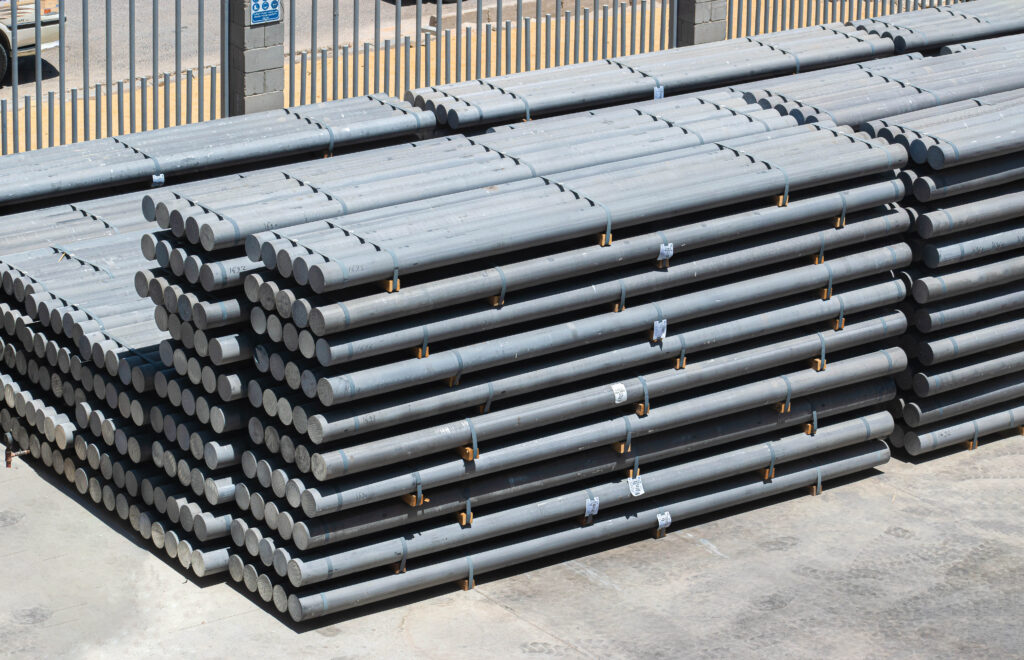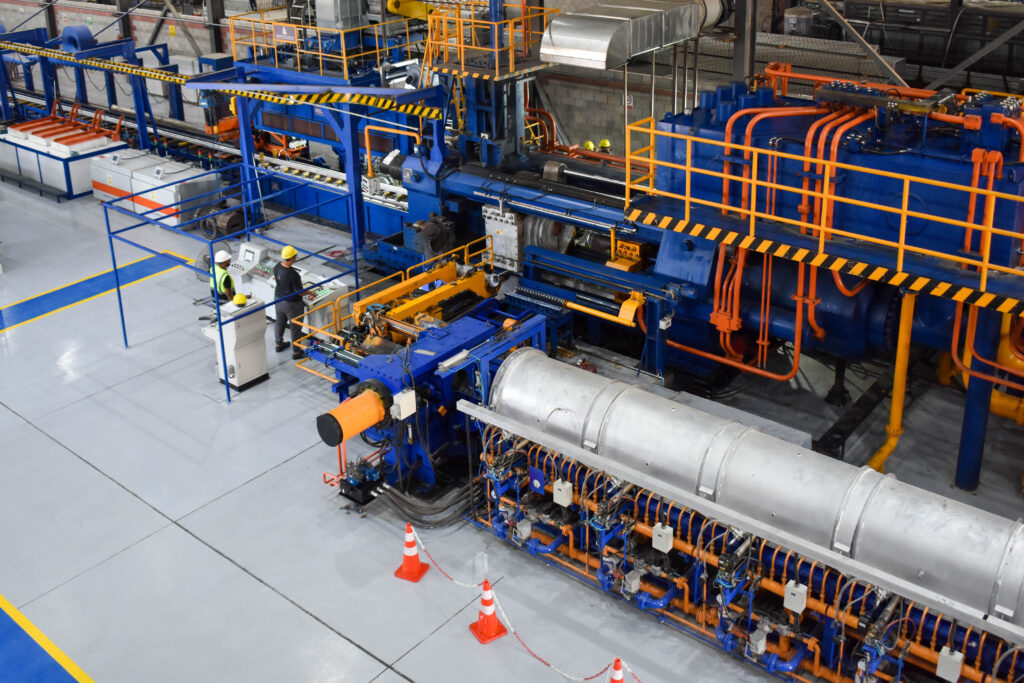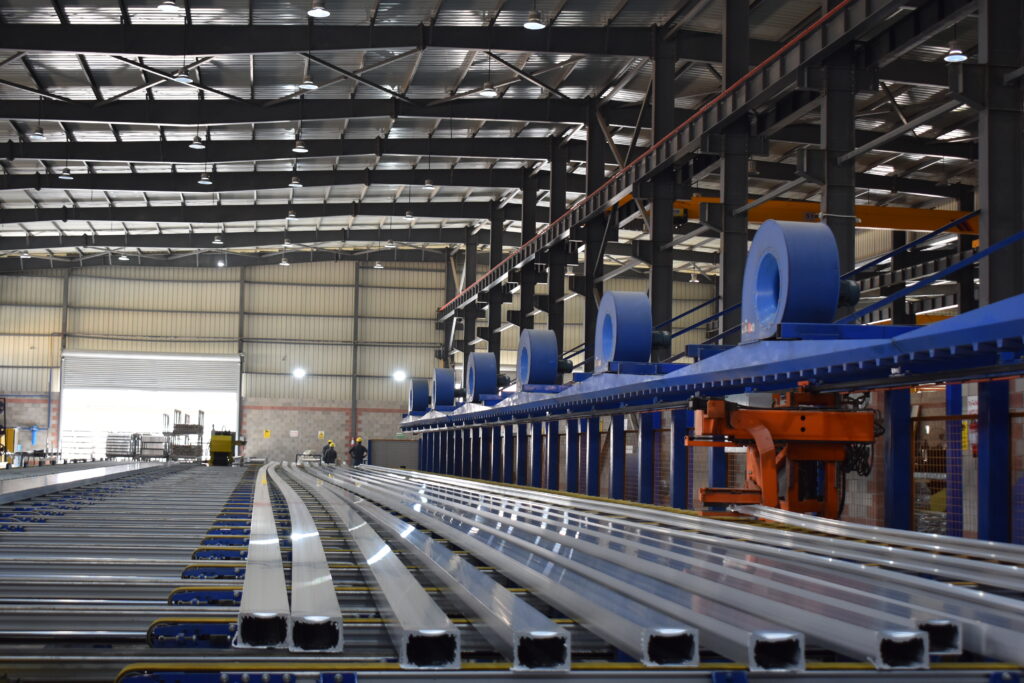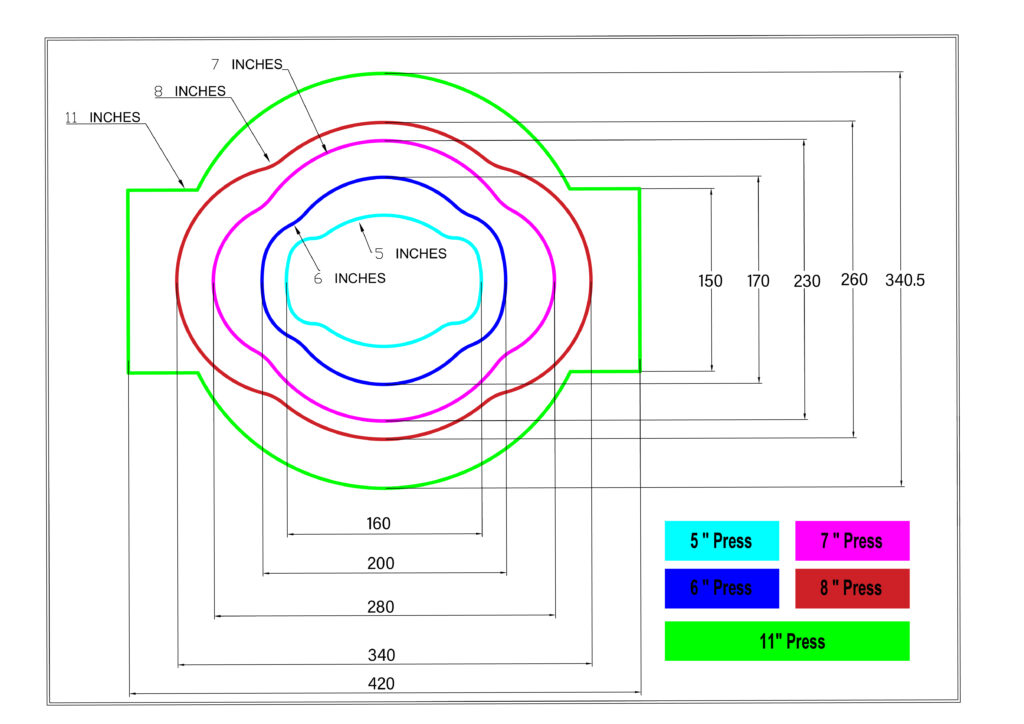Aluminium Profiles Production
Aluminium Profiles Production
At delemar for aluminium profiles production, we specialise in manufacturing a diverse range of standard profiles, including angles, bars, tubes, squares, rectangles, flats, and more.



About
Delemar for Aluminium profiles production
Delemar has positioned itself as the preferred supplier of Aluminium solutions in the MENA region, Europe, and the USA, offering innovative and advanced solutions characterised by the highest quality, competitive pricing, and exceptional sales experience.
Production capacity
Our current annual production capacity stands at 85,000 tons of aluminium profiles across our five factories. Forty percent of our production caters to the local market, while the remaining sixty percent is exported to clients in the MENA region, Europe, and USA, owing to our compliance with international standards and quality certifications.
Production Facilities
Aluminium extrusion involves shaping aluminium alloy by forcing it through a die with a specific cross-sectional profile. This process enhances fabrication assembly, improves strength and stiffness, and yields lightweight, corrosion-resistant profiles with excellent thermal and electrical conductivity.
Most extruded aluminium alloys are lightweight, corrosion-resistant. Aluminium extrusion is a process in which aluminium is heated until it becomes soft and pliable and then forced through a shaped opening in a die to create a specific cross- sectional profile. The aluminium is then cooled and solidified in its new shape. Usually, the die’s opening can be modified to create different shapes and sizes to meet a user’s specific needs. This process enables Aluminium extrusion manufacturers to produce long lengths of aluminium profiles ranging from basic tubes or bars to extremely complex designs.
Extruded aluminium finds applications in various industries, including automotive, construction, and furniture, due to its durability, lightweight nature, corrosion resistance, and recyclability.
Production capabilities
The maximum sizes can vary depending on the alloy, material thickness, complexity and tolerances. Please contact us for defined limits.
Surface Treatment
Delemar boasts a comprehensive surface treatment facility offering the latest treatments such as anodising and electrostatic powder coating paint.
Packing Department
We adhere to global standards in our packing processes, providing three packaging options:
- Spiral Packaging
- Carton
- Shrink Film
Quality Standard
We adhere to applicable international standards such as EN, DIN, ASTM, and others to ensure the highest quality of our products.
Quality Control Department
Quality tests are conducted at regular intervals during and after production to guarantee flawless end products. To uphold our commitment to quality, we utilise Engview quality testing machines for dimensional measurement and surface inspection. This system, developed and manufactured by Engview, enables us to enhance quality, reduce scrap rates, cut costs, and boost productivity, cementing our position as one of the top aluminium manufacturers in Egypt.
Operation Capabilities
Delemar for Aluminium Profiles Production has earned an enviable reputation for the reliability of its aluminium extrusions which are used in a broad range of applications and industries.
We have qualified and experienced employees ready to extrude high-quality aluminium profiles on 12 modern extrusion presses of 5″, 6″, 7″ and 11″. The total annual extrusion capacity reaches more than 85,000 tonnes.
With this capacity, we can fulfil our customers’ requirements and produce a wide range of profiles in alloys 6082, 6005, 6060, 6063, 6061 or others (on request), with a maximum length of 12,000 mm and a maximum weight of 20 kg/m.
All extrusion presses use the latest manufacturing software to decrease production waste whilst increasing the efficient use of recycled aluminium billets. 100% of the aluminium waste generated during extrusion is collected and then recycled into aluminium ingots for future production.
Delemar not only has 12 extrusion presses, but also several processing and finishing lines that make it possible to manage the entire production process – from enquiry to delivery: extrusion, powder coating and machining.
Our powder coating lines are the most advanced of their kind in Egypt. They enable the powder coating of extruded profiles in a wide range of standard and non-standard finishes – including the entire RAL colour palette according to the Qualicoat Standards.
Surface Treatments we offer are; Powder Coating, Anodising, Wood Effect Finish.
Pre-treatment process including degreasing, dual etching, passivation according to Qualicoat Seaside.
The powders we use are Polyester, Polyurethane, Hybrid, PVDF from AkzoNobel, Jotun and PPG.
Details about our horizontal powder coating capabilities; all type of profiles, aluminium sheets, up to 7.5 metres long, and 100kg/profile.
Details about our vertical powder coating capabilities; for aluminium profiles up to 7 metres long, and 45kg/profile.
Capacity of 20,000 tonnes of coated aluminium annually.
Introduction to Aluminium Extrusion
In the vast realm of manufacturing, certain processes stand out for their sheer ingenuity and transformative impact. Aluminium extrusion is one such marvel. At its core, aluminium extrusion is a technique used to transform aluminium alloy into Shapes with a definitive cross-sectional profile. Imagine pushing a malleable material through a shaped hole in a die, much like how we might squeeze toothpaste from a tube. This simple yet ingenious method allows for the creation of intricate designs and structures, all whilst maintaining the inherent strength and lightness of aluminium.
The significance of aluminium extrusion in contemporary manufacturing cannot be overstated. As industries strive for efficiency, cost-effectiveness, and sustainability, aluminium extrusion emerges as a frontrunner, offering unparalleled flexibility in design, combined with the durability that modern applications demand. From the sleek frames of our cars and the sturdy beams supporting our homes to the intricate components of our electronic devices, the evidence of aluminium extrusion’s influence is all around us.
What is Aluminium Extrusion?
At its heart, aluminium extrusion is a transformative process. To put it simply, it involves forcing a pre-heated aluminium billet (a solid, cylindrical block of aluminium) through a shaped opening in a die. This die opening dictates the cross-sectional profile of the extruded part. As the aluminium is pushed through the die, it takes on this specific shape, emerging on the other side as a long piece with the desired profile.
But where did this ingenious process originate? The roots of extrusion can be traced back thousands of years. The ancient Egyptians employed a basic form of extrusion to produce gold jewellery, pushing the malleable metal through dies to create intricate decorative pieces. The concept of extruding metals for functional and aesthetic purposes persisted through the ages, with lead and tin being common materials for extrusion by the 18th century.
Aluminium, however, didn’t make its debut in the extrusion scene until the early 20th century. Its abundance, combined with its unique properties — lightness, strength, and resistance to corrosion — made it an attractive candidate for extrusion. As technologies evolved and the potential of aluminium became more evident, the industry grew exponentially. Today, modern aluminium extrusion processes, backed by advanced machinery and refined techniques, allow for an even wider range of applications, from aerospace to architecture.
The Aluminium Extrusion Process
Understanding the aluminium extrusion process requires a detailed look into the steps that transform a humble billet into a finely crafted profile. The process, while seemingly straightforward, is a culmination of precise techniques and methodologies that ensure the finished product’s integrity and quality.
1. Billet Preparation:
The journey begins with the billet, a solid cylindrical block of aluminium. Billets are cut from longer logs of aluminium. Before anything else, these billets undergo cleaning to ensure that no contaminants interfere with the extrusion process. The size of the billet (both diameter and length) is chosen based on the profile’s size and the length of the intended extrusion.
2. Heating:
For the aluminium to be malleable enough to be forced through a die, it needs to be heated. The billets are placed in a furnace, where they’re heated to temperatures ranging between 425°C to 500°C, making them soft but not molten.
3. Extrusion through the Die:
Once heated, the billet is transferred to the extrusion press. Here, a hydraulic ram applies immense pressure, pushing the softened billet through the die. As the aluminium exits through the die, it takes on its shape, transforming from a simple cylinder into a detailed profile.
4. Cooling and Straightening:
After extrusion, the long, continuous aluminium profile needs to be cooled. This is typically done using fans or water sprays. Once cooled, the profile may warp slightly due to the temperature changes and pressures experienced during extrusion. To rectify this, the profile is straightened while it’s still slightly pliable.
5. Cutting:
The final step involves cutting the extruded profile to the desired lengths. Precision saws are used to ensure clean, accurate cuts, resulting in pieces ready for further processing or final application.
Aluminium Alloys Used in Extrusion
The malleability, strength, and lightweight nature of aluminium make it a popular choice in various industries. However, pure aluminium has its limitations. To enhance specific properties and make the metal suitable for different applications, aluminium is alloyed with other elements. These combinations, known as aluminium alloys, are crucial in the extrusion process.
Overview of Common Alloys Used at Delemar and Their Properties:
6000 series – Al + Mg + Si
6061 Aluminium: This alloy is a combination of aluminium, magnesium, and silicon. It’s renowned for its excellent corrosion resistance, weldability, and strength. It’s often used in structural applications and is also a favourite for frames, fittings, and even some aircraft parts.
6063 Aluminium: With a similar composition to 6061 but with slightly different proportions, this alloy is more formable and accepts high-quality surface finishes. It’s often used in window frames, door frames, and architectural extrusions.
6082 Aluminium: Has high strength and is suitable for extrusion of cross-sections that are not too complicated. Typical applications are load carrying structures in the ship-, offshore-, transport-, and building industry such as platforms, bridges, stairs, scaffolds and handrails. The material is suitable for anodising for protective purposes.
6005 Aluminium: Has higher strength than 6063 but is slightly harder to extrude. The material withstands comparatively little elongation before there is permanent deformation in the heat-treated condition. This alloy can be exposed to greater inter-crystalline corrosion than 6060, 6063 and 6082. It is suitable for anodising for protective purposes but the quality of the surface makes decorative finishing more difficult.
6060 Aluminium: offers medium strength and is easy to extrude even for complicated cross-sections. This alloy is the most used extrusion alloy. It has good formability during bending in the non-heat-treated condition. Typical applications are extrusions for windows and doors, lighting, awnings, handrails and furniture. This material is highly suitable for anodising, both for decorative and protective reasons.
The 6000 series have good extrudability and can be solution heat treated at the extrusion temperature. Furthermore, these alloys have medium to high strength, are easy to weld and offer good resistance to corrosion, even in marine environments. The bulk of the extruded material for load bearing constructions is made from these qualities. They are used for load bearing constructions both on land and at sea.
The versatility of aluminium extrusion is truly remarkable. It caters to a multitude of industries, each with its unique demands, be it the intricate profiles required in architectural designs or the high-strength components sought after in aerospace. Beyond its malleability and adaptability, the process underscores the importance of material efficiency, precision, and sustainability.
For manufacturers, designers, and all those involved in the Delemar production chain, it’s an exciting era. As technologies advance and global needs shift, the aluminium extrusion process offers a platform to innovate and evolve. It’s a canvas where creativity meets functionality, and the results are tangible products that shape our everyday world.
The Delemar Group utilises the latest technologies and best practices, in order to maintain and sustain our high levels of customer satisfaction.
Production Capabilities
PRESS SIZE
NO. OF PRESSES
CAPACITY / ANNUALLY (TONS)
5 " PRESS
2
7200
6 " PRESS
1
5000
7 " PRESS
6
36.000
8 " PRESS
2
20.000
11 " PRESS
1
18.000

Products Range
We Delemar for Aluminium profiles production has a wide range of sectors including Architectural, Industrial, Construction, and Automotive industries all over the globe, we produce a diverse range of standard profiles such as angles, bars, tubes, squares, rectangles, and I-bars, among others. Whether you’re working on an industrial project or looking to upgrade your automotive components, we have the expertise and experience needed to deliver the perfect solution for your needs. Choose us for top-quality products that are tailored to your unique requirements.
Services
Fabrication
Equipped with set of machines with high machining capabilities, including:
Milling, drilling,punching, notching,taping, stamping,cutting to precise lengths. All this processes available for longitudinal aluminium profiles (6 meters or more) and also available for small pieces of aluminium profiles , according to customer drawings and requirements with high quality.
Thermal break assembly line
We have a very efficient thermal break assembling line consisting of :
* 6 – axis cnc high precision knurling machine with strip insert device ( Two machines)
* 11- axis cnc high precision Rolling ( crimping) machine ( one machine)
* automatic conveyor system
Thermal break advantage
1-Speeds (productivity )
* 0-60 m/min knurling.
* 0-60m/min rolling.
2. print Qr codes scanning ( profile identification)
3. suitable for wide range of profiles with traditional and special shapes.
4. Knurling range 380 x 260 mm
5. Rolling range 210x 390 mm
Latest Developments
1. Expanding Global Market Presence
In response to shifting economic conditions and material shortages, we have accelerated our export strategy, successfully expanding into 11 new international markets. This achievement reflects our commitment to growth and market diversification, ensuring that Delemar remains a key player in the global aluminium profiles industry.
- Targeting high-demand regions in Europe, Africa, and the Middle East.
- Strengthening supply chain resilience to overcome local material shortages.
- Building partnerships with key international clients for sustained market growth.
2. Advanced Production and Innovation
We have invested in cutting-edge technology and automation to meet the increasing demand for high-performance aluminium profiles. These advancements allow us to:
- Enhance production efficiency with state-of-the-art extrusion lines.
- Achieve higher precision and quality in profile manufacturing.
- Reduce lead times while maintaining superior product consistency.
3. Sustainable and High-Quality Aluminium Solutions
At Delemar, we prioritise sustainability and product excellence. Our latest initiatives include:
- Eco-friendly production methods to reduce environmental impact.
- Premium-grade aluminium alloys for superior strength and durability.
- Innovative surface finishing techniques for enhanced corrosion resistance and aesthetic appeal.
4. Strengthening Our Position in the Industry
By adapting to market demands and expanding globally, Delemar Industrial Group continues to set new benchmarks in aluminium profile production. Our strategic focus on innovation, sustainability, and international growth ensures that we remain a trusted leader in the industry.


